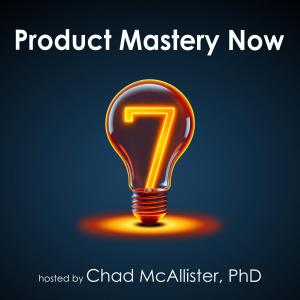Product Mastery Now for Product Managers, Leaders, and Innovators

TEI 274: The mindset product managers need to breakthrough barriers – with Dana Wilde
Train your brain for success in product management
What is holding you back from greater success, from achieving what you want, from getting what you deserve? Now, this is not an infomercial for some new self-help fad. Instead, it is a grounded discussion about how you are holding yourself back and how to change that — to enable your success.
Keep listening as Dana Wilde, host of The Mind Aware Show podcast and author of Train Your Brain describes practical ways to make your brain work better for you.
Summary of some concepts discussed for product managers
[4:00] What is mindset?
Mindset is a trained habit of thought. Mindset affects everybody no matter what they’re doing.
[5:14] What are some common mindset issues entrepreneurs have?
One big issue is self-doubt, lacking confidence in yourself. Another issue is thinking you’re too busy.
[7:18] What is the science behind mindset?
Training your brain is very practical. The most important thing I discovered about the brain is how the reticular activating system affects our day-to-day life. The reticular activating system is a part of the brain that processes incoming information so that you focus on what you’re thinking and talking about. What you think about is what you continue to focus on.
[11:49] When we lack confidence or feel too busy, how can we train our brain to respond well?
The system of training your brain has four parts. The first step is to be aware. Ninety-five to ninety-nine percent of our day, we’re unconsciously on auto-pilot. If you can increase the percentage of the day that you’re aware, you can have radical shifts in your results. Being aware means realizing what you’re saying and catching negative thoughts.
The second step is to decide. Ask whether you want your reticular activating system to focus on something or not. You can choose.
The third step is to find a way to talk about the current situation in a way that feels better.
The fourth step is the positive emotion that’s generated from this system. You can be a better thinker. When you choose better thoughts, your brain will do the rest of the work for you.
[15:48] How can we have a better response to feeling too busy?
The problem isn’t that you’re too busy. The problem is the negative emotion generated by talking and thinking about it. You can be busy and happy. The word “but” is a powerful word because it negates everything that comes before it. When you recognize that you’re feeling busy, but don’t want to create negative emotion, use the word “but” to talk about the situation in a way that feels better. For example, “I’m busy, but I like having responsibility and being seen as competent, or I like that people trust me to do my job well, or I like that I get stuff done on time.” You can start to feel good about being busy. Happiness is practical and you get better results when you’re happy. When you’re happy, you’re more productive. Feel happy first, then intentionally take action. We don’t know how awesome we are. We need to credit ourselves with our unique experiences, desires, and backgrounds. Embrace your uniqueness.
Bonus Question: What are some specific exercises we can use to start our mindset journey?
Write on a Post-it note something like, “Today’s a good day,” or “I can think in my head,” and put it on your alarm clock. When you wake up, take 60 seconds to prime your brain by saying things like, “That’s right, I can think in my head. I can choose my thoughts. I’m going to make today a great day.” Throughout your day, intentionally remind yourself of the good things about the day.
Embrace your unique gifts. Be nicer to yourself, try to have a little more fun,






 Visit Podcast Website
Visit Podcast Website RSS Podcast Feed
RSS Podcast Feed Subscribe
Subscribe
 Add to MyCast
Add to MyCast